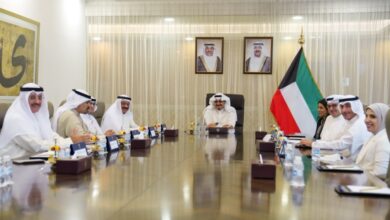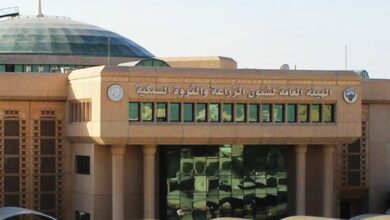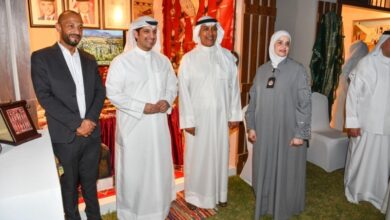Mirroring the diversity, values, and interests of South Africans
As part of our weekly series, ‘Women in Diplomacy’, we spoke with Busisiwe Mpungose, chargé d’affaires at the Embassy of South Africa, on her interest and passion that led to a diplomatic career, the challenges women face as diplomats, and how diplomacy is not only about policies and agreements, but also about service to humanity and consistent acts to uplift lives.
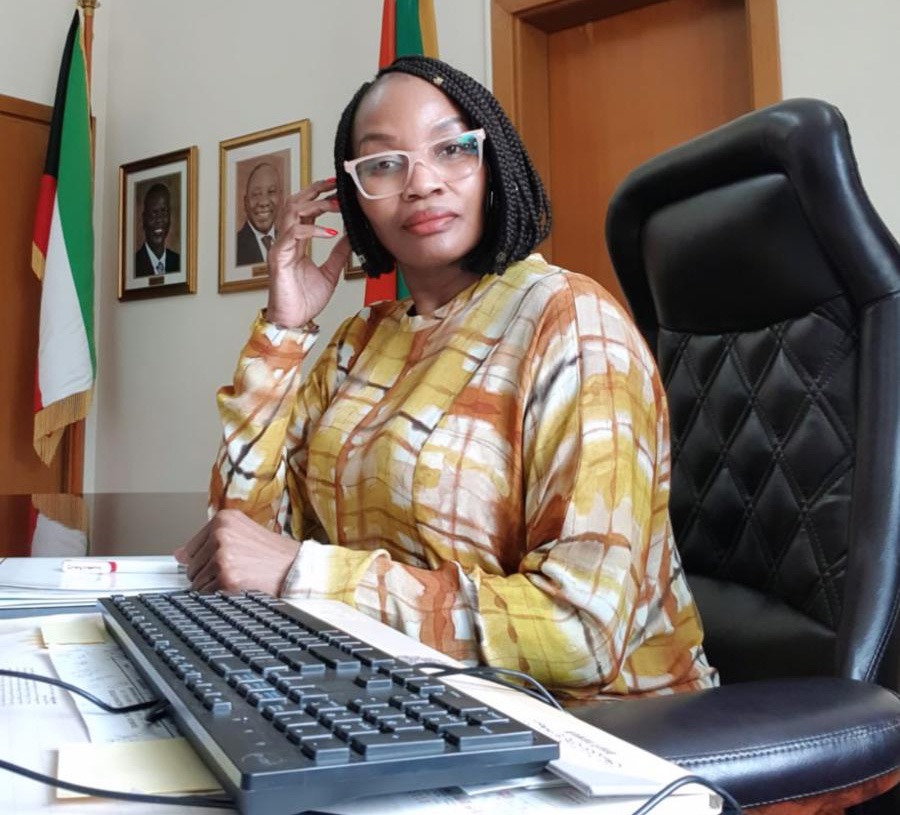
The Times Kuwait Report
What inspired you to pursue a career in diplomacy?
My path into diplomacy was not imagined from a distance; it was born out of direct experience, deep interest, and transformative exposure. I had the privilege of serving on various government-led organizing committees for major events, including the funeral of former President of South Africa, Nelson Mandela, the 2010 FIFA World Cup, presidential inaugurations, high-level international summits and conferences, as well as planning and coordinating for incoming and outgoing foreign visits.
In those platforms, I saw how our nation,with its history of struggle, reconciliation, and unity, engaged with the world to build and strengthen relations. I witnessed how diplomacy was used by our leaders, not just as a tool of statecraft, but as a bridge between nations. I witnessed how relations were built across tables on various platforms. These experiences offered me a firsthand insight into the mechanics of international relations, diplomacy, protocol, negotiations, and cooperation. They revealed to me the quiet power and meticulous discipline of diplomacy.
That early experience was not just memorable, it was transformative, and it taught me a high level of discipline, responsibility and the importance of paying attention to detail, understanding that there is no room for error in my line of work.
This triggered a spark that led me to enrol in an intense diplomatic training program within the Department of International Relations and Cooperation, an experience that did not just develop my skills, but solidified my purpose. The purpose was not just to ‘enter’ the profession, but to fulfil a calling anchored in serving our people and contributing in making South Africa a better place to live.
What challenges have you faced as a woman in diplomacy, and how did you overcome them?
Generally, most challenges we face as women are self-made or self-imposed. These included self-doubts about our credibility, capability and capacity to overcome these challenges. Even in progressive democracies, research on this subject shows that women in diplomacy still face subtle tests of credibility.
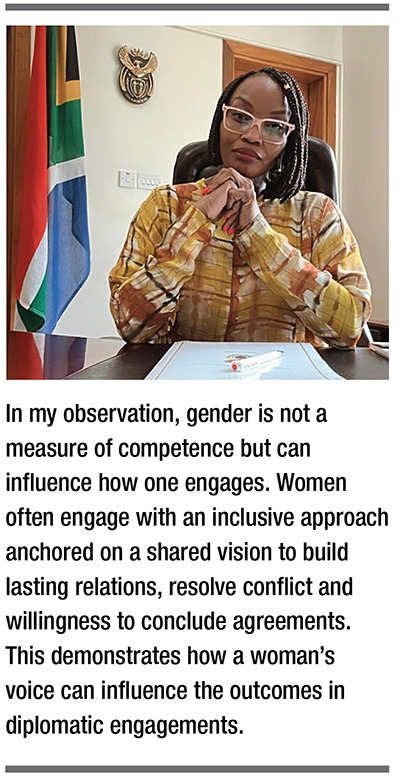 South Africa’s democratic journey has produced extraordinary women leaders; from former Ministers of Foreign Affairs Dr Nkosazana Dlamini-Zuma, Dr Naledi Pandor, to our ambassadors, the head representatives in the United Nations (UN) and in the African Union (AU), and many others who are leading with grace, grit and gratitude, as well as sound authority on the global stage.
South Africa’s democratic journey has produced extraordinary women leaders; from former Ministers of Foreign Affairs Dr Nkosazana Dlamini-Zuma, Dr Naledi Pandor, to our ambassadors, the head representatives in the United Nations (UN) and in the African Union (AU), and many others who are leading with grace, grit and gratitude, as well as sound authority on the global stage.
Early in my career, I learned that proving capability as a woman sometimes meant working twice as hard and being twice as prepared. I did not meet these challenges with protest; I met them with performance. Consistent excellence, composure under pressure, and the discipline to understand and master the mandate became my silent signature. Over time, my work spoke louder than the doubt.
How do you think gender influences diplomatic styles or approaches?
In my observation, gender is not a measure of competence but can influence how one engages. Women often engage with an inclusive approach anchored on a shared vision to build lasting relations, resolve conflict and willingness to conclude agreements. This demonstrates how a woman’s voice can influence the outcomes in diplomatic engagements.
Can you share a moment when you felt you made a meaningful impact through your diplomatic work?
In spite of my mandate of maintaining the bilateral relations of the two countries and supporting our government’s foreign policy interests here in Kuwait, I recently witnessed and got reminded of how diplomacy can also transform lives and restore dignity through the acts of compassion. This moment was during our Embassy’s visit to the Public Authority for Manpower (PAM) Women Shelter in the Jleeb Al-Shuyoukh area, which supports expatriate workers facing legal or employment-related challenges, in commemoration of the Nelson Mandela International Day. Through shared laughter, participation in creative arts and crafts, as well as a game of volleyball with women residents at the shelter, hope was restored.
There, I witnessed resilience in the midst of distress, smiles brought by our act of kindness. That moment also impacted me personally. It once again proved that diplomacy is not only about policies and agreements, but also about service to humanity and consistent acts to uplift lives, bringing hope where there may be none. For me, the impact is clear— diplomacy is not one moment, but a chain of actions— involving building relations, promoting economic opportunities, and continuous acts of kindness towards the vulnerable and the less-privileged. As Nelson Mandela said: “What counts in life is not the mere fact that we have lived. It is what difference we have made to the lives of others”.
What leadership qualities do you believe are essential for success in this field?
From my experience, and from watching those before me, success in diplomacy rests on being patriotic, having high-integrity, being a strong communicator, and good listener. It also calls for being strategic and analytical, meticulous, having cultural intelligence, humility and being courageous and resilient.
What advice would you give to young women aspiring to join the foreign service?
The general principle of diplomacy is clear; you are here to serve. The understanding that diplomacy is not a hobby but a calling, which you can only pursue if you have an interest and passion for it. Your role and exposure are meant to make a tangible and lasting impact in the lives of those you represent.
How can diplomacy better reflect the diversity of the societies it represents?
Diplomacy should be inclusive and non-discriminatory. For me as a South African diplomat, our democracy has taught me that inclusion is not a weakness, but a strength. As diplomats, we have a unique responsibility and opportunity to mirror the diversity, values and interests of the people we represent. As a result, our work must reflect the authentic voice of our societies, ensuring that every policy, negotiation and engagement speak for the realities, aspirations, and needs of those we serve.
How would you describe your tenure/experience in Kuwait so far?
Serving in Kuwait has been both a profound personal and professional enrichment for me. In spite of the cultural differences and backgrounds, I have been warmly embraced in my almost four years of serving in Kuwait, and the Kuwaiti people generally, must be commended for their warmth and hospitality. The common vision between our two governments has allowed our embassy the opportunity to engage effectively and achieve meaningful collaborations and partnerships with various critical stakeholders within the government and the private sector.
What has been particularly remarkable is the level of our bilateral relations with Kuwait and the shared interest to grow these even further. It has been very exciting and rewarding to see the growing interest in our products and business-to-business opportunities. Equally so, the growing interest among travelers from Kuwait to visit South Africa, which is evident from the recent travel statistics.
This development has created an opportunity to strengthen the South Africa-Kuwait relations, as well as to grow our people-to-people relations and highlights further potential for increased trade, tourism and cultural exchanges between our two countries.
The humility and overall character of the Kuwaiti people in all sectors, have elevated my experience beyond expectation. I have never felt discriminated against, undermined or sidelined, as a woman of different culture and background. Their warmth and respect have echoed the spirit of Ubuntu—an ancient African word which means, ‘I am because you are’– which is very much cherished in South Africa.
It has also made my interactions at all levels meaningful, to an extent that numerous opportunities have been identified and availed to advance our interests, making this experience both inspiring, impactful and unforgettable. My profound gratitude also goes to all my colleagues within the diplomatic corps for their tremendous support in pursuit of our common interests in the State of Kuwait.







